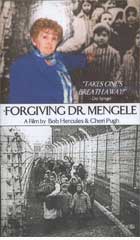
Forgiving Dr. Mengele 2005
Distributed by First Run/Icarus Films, 32 Court St., 21st Floor, Brooklyn, NY 11201; 800-876-1710
Produced by Bob Hercules and Cheri Pugh
Directed by Bob Hercules and Cheri Pugh
VHS, color and b&, 80 min.
Sr. High - Adult
Holocaust and Genocide Studies, Jewish Studies, World War II, Philosophy
Date Entered: 05/16/2006
Reviewed by Debra Mandel, Head, Media Center, Northeastern University Libraries, Boston, MAForgiving Dr. Mengele is a riveting portrait of Holocaust survivor Eva Mozes Kor, who grants amnesty to the Nazis in order to finally heal herself. Film directors Bob Hercules and Cheri Pugh have skillfully edited historical and contemporary footage to present Eva’s personal journey and to document her defenders and critics in the face of such controversy.
At age 10, Eva and her twin sister Miriam were abruptly and permanently separated from their family in Auschwitz and became human guinea pigs in Dr. Josef Mengele’s vile genetic experiments. Their liberation by the Russians was captured on film10 months later. Though Eva did not suffer any long-term affects from those experiments, Miriam’s kidney’s never fully developed, and Eva eventually donated a kidney to her. In 1993, as Miriam’s condition worsened, Eva raced to research what chemical Mengele injected into Miriam, but she died. Two months later, Eva went to Bavaria and met with Dr. Hans Munch, an associate of Dr. Mengele, “the only S.S. officer acquitted after the war.” In this very important excerpt, Dr. Munch describes his nightmarish state of mind after the war and told Eva that Dr. Mengele confided in no one and wrote nothing down about his work. Eva was “flabbergasted” by Munch’s display of contrition and asked him to accompany her to Auschwitz’s 50th anniversary ceremony to publicly sign a document stating that he witnessed the gassing of Jews in Auschwitz. In return, Eva gave Munch a letter of forgiveness and audibly forgave the Nazis. Other survivors present, including Mengele twins, were outraged by Eva’s pronouncement.
As counterpoint to the Holocaust story, the directors also film Eva on the job as a feisty real estate broker in Terre Haute, Indiana, and include moving interviews with her best friend, husband, son, and daughter. In addition, she is filmed teaching school groups in Terre Haute’s Holocaust Education Center, which she started, and then rebuilt, after a hellish experience with arson. Dialogues with other Holocaust survivors, vigorously opposed to Eva’s forgiveness, are also featured, and Holocaust expert Michael Berenbaum, provides commentary on Mengele’s experiments. Another interesting chapter is Eva’s meeting with Palestinians in Israel, with whom she is unable to engage in easy discussions. It is clear she is not ready to forgive them.
For all its complexity and multiple points and perspectives for discussion, Forgiving Dr. Mengele is highly recommended for academic and public library collections. It has great value for examining the legacy of Holocaust survivors and the lessons future generations must continue to examine. As Holocaust survivors are dwindling each year, it is critical that their stories be accessible in libraries and archives and preserved. Eva and the voices of Forgiving Dr. Mengele must not be forgotten.